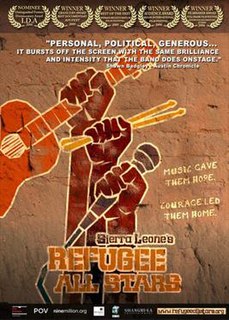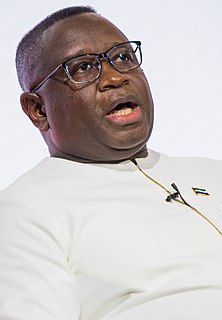
Sierra Leone's music is a mixture of native, French, British, West Indian and Creole musical genres.

Makeni is the largest city in the Northern Province of Sierra Leone. The city is the capital of Bombali District, and is the economic center of the Northern Province. Makeni is the fifth largest city in Sierra Leone by population. The city of Makeni had a population of 80,840 in the 2004 census and a 2013 estimate of 112,428. Makeni lies approximately 110 miles east of Freetown. Makeni is home to the University of Makeni, the largest private university in Sierra Leone.

Koidu Town is the capital and largest city of the diamond-rich Kono District in the Eastern Province of Sierra Leone. The population of Koidu Town is 124,662 based on the 2015 Sierra Leone national census. Koidu Town is the fifth largest city in Sierra Leone by population, after Freetown, Kenema, Bo and Makeni. Koidu Town is a major urban, business, commercial and diamond trade center. Koidu Town lies approximately 280 miles east of Freetown, and about 60 miles north of Kenema.

Ernest Bai Koroma is a Sierra Leonean politician who served as the fourth President of Sierra Leone from 17 September 2007 to 4 April 2018.
Lamin Conteh, widely known by his nickname Junior Tumbu, is a Sierra Leonean former professional footballer who played as an attacking midfielder. He represented the Sierra Leone national team between 1994 and 202.

Sierra Leone's Refugee All Stars is a documentary film about the musical band of the same name composed entirely of refugees from Freetown displaced to Guinea during the 1991-2002 civil war in Sierra Leone.

Sierra Leone's Refugee All Stars is a band from Sierra Leone which was formed by a group of refugees displaced to Guinea during the Sierra Leone Civil War. Since their return to Freetown in 2004, the band has toured extensively to raise awareness for humanitarian causes. Their story is documented in the 2005 documentary film Sierra Leone's Refugee All Stars.
Christian Caulker is a Sierra Leonean footballer who currently plays for Maryland Bobcats FC.
Dr. Christiana Ayoka Mary Thorpe is a former two-term Chief Electoral Commissioner and Chairperson of the National Electoral Commission, an independent agency created by the Sierra Leone government to organise and supervise national, regional and local elections. She is the first woman Chief Electoral Commissioner in the country's history. She was also a Deputy Minister of Education in the 1990s. In March 2016, she was appointed a Deputy Minister of Education, Science and Technology, though one source states that Parliamentary approval was still pending.
Ibrahim Koroma is a Sierra Leonean footballer who plays as a midfielder for Motala AIF.

Makari Gbanti is a chiefdom of Bombali District in the Northern Province of Sierra Leone. Officially, the principal town now lies at Masongbon. However, the village of Panlap is also considered the headquarters. The historical centre was Makari.

Chris Velan is a Montreal-based singer-songwriter and guitarist.
Khadyjah Fofanah better known by her stage name Khady Black is a Sierra Leonean rastafarian and Roots reggae musician. She is Sierra Leone's first international female reggae artist. Khady Black sings mainly in English, Krio and in her native Mandinka language.
Sylvia Olayinka Walmina Oreshola Blyden is a Sierra Leonean journalist, political commentator, newspaper publisher, and the current Sierra Leone minister of Social Welfare, Gender and Children Affairs. She served as Special Executive Assistant to Sierra Leone's president Ernest Bai Koroma from 2013 to 2015.
Union Trust Bank (UTB), whose full name is Union Trust Bank Limited, is a commercial bank in Sierra Leone. It is licensed as a "commercial bank" by the Bank of Sierra Leone, the central bank and national banking regulator.
Rise & Shine (2010) is the second album by Sierra Leone's Refugee All Stars, following their debut album Living Like a Refugee (2006). The album was produced by Steve Berlin, renowned for his work with Los Lobos, Angélique Kidjo, Michelle Shocked, Rickie Lee Jones and Ozomatli, and recorded in their hometown of Freetown, Sierra Leone and New Orleans, Louisiana. Reflecting the influences of both recording locations, the album's sound is "a fusion of traditional West African music and roots reggae, inflected with New Orleans styles."
Libation (2014) is the fourth album by Sierra Leone's Refugee All Stars, following Radio Salone (2012). It was produced by Canadian singer-songwriter Chris Velan, mixed by Iestyn Polson, and recorded at Lane Gibson Recording & Mastering in Charlotte, Vermont. The album celebrates the band's 10-year anniversary with a "return to roots, specifically the acoustic "around the campfire" vibe of their earliest recordings." Their sound combines elements of highlife, palm wine, maringa, baskeda and gumbe with modern dubstep and reggae.
The following lists events that happened during 2015 in Sierra Leone.

General elections were held in Sierra Leone on 7 March 2018 to elect the President, Parliament and local councils. Incumbent President Ernest Bai Koroma did not run for another term, as he was constitutionally ineligible, having served the maximum ten years in office.
Zach Niles, is an American filmmaker and film producer. He is best known as the director and producer of the critically acclaimed film Sierra Leone's Refugee All Stars. Apart from acting, he is also a strategist, entertainment producer and a social justice advocate.









